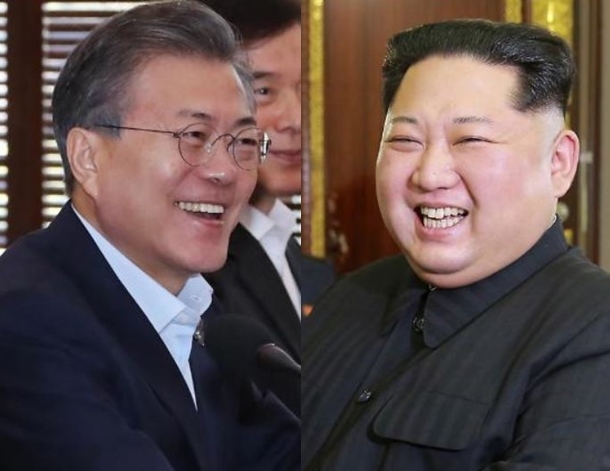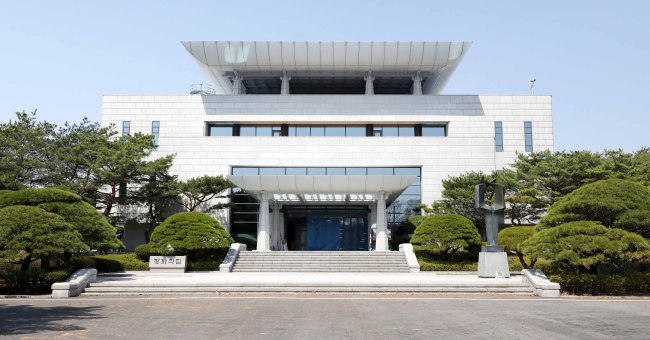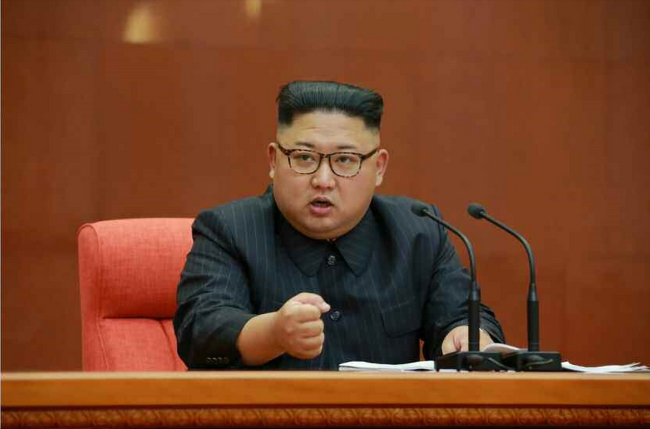With the historic inter-Korean summit just around the corner, speculation is rampant over what the two leaders will discuss amid hopes that their meeting will pave the way for peace on the Korean Peninsula.
According to Cheong Wa Dae, the main agenda will be narrowed down to: denuclearization of the Korean Peninsula, establishment of the peace regime and improvement of inter-Korean relations.
But exactly what will be discussed, and more importantly, what will be announced at the end of the day is hard to predict. Unlike most summits where the agenda is coordinated at working-level discussions, the upcoming inter-Korean summit largely relies on the two leaders’ determination for a political breakthrough.

President Moon Jae-in and North Korea`s leader Kim Jong-un. Yonhap
Topping the agenda is undoubtedly the denuclearization of North Korea. Either explicitly or implicitly, President Moon Jae-in will confront North Korea’s leader Kim Jong-un over his position on nuclear and missile programs.
The question is how much pressure Moon can exert on Kim, who has just declared a “great victory” in building a nuclear state through his relentless pursuit of nuclear ambition.
While Kim has pledged to stop conducting nuclear and ballistic missile tests, doubts persist over his commitment to denuclearization, as the young leader did not mention the country’s existing nuclear arsenal.
“President Moon should at least give a positive response to Kim’s decision and have the idea reflected in the joint statement,” said Hong Min, director of the North Korean studies division at the Korea Institute for National Unification.
Hong added Moon should seek the North Korean leader’s commitment to the “prompt implementation” of North Korea’s denuclearization, but the details should be left to the subsequent meeting between Kim and US President Donald Trump.
There appears to be a significant gap between Washington and Pyongyang over what constitutes denuclearization -- a process littered with failures since the first nuclear crisis in the early 1990s.
The Trump administration pledged not to repeat past mistakes, calling for a complete, verifiable and irreversible dismantlement of Pyongyang’s nuclear weapons. North Korea, on the other hand, advocates a “phased, synchronized” denuclearization, a process which the Trump administration had described as a “failure.”
Such differences raise the possibility that President Moon may focus on drawing up a broad agreement on denuclearization, rather than nailing down specific procedures for achieving the goal.
“The most important thing to watch is whether the two Koreas’ leaders can reaffirm their commitment to denuclearization,” said presidential chief of staff Im Jong-seok, who chairs the presidential preparatory committee for the inter-Korean summit, in a press briefing last week.

Inter-talk is to be held inside Peace House inside truce village of Panmunjum. Yonhap
Even if Moon and Kim manage to hammer out an agreement on denuclearization, it would have limited implications unless the two Koreas translate them into specific measures to end decades-old hostilities.
That is the context in which establishment of a “peace regime” on the Korean Peninsula will be discussed. In other words, it refers to what the US and South Korea can do in return for North Korea’s decision to abandon nuclear weapon.
While there is no specific way to establish a peace regime, it appears to require at least two procedures: a declaration of an official end to the 1950-53 Korean War and replacing the armistice agreement with a peace treaty.
“We have to end the 65-year-old armistice and pave the way for a peace treaty by declaring an end to the Korean War,” said Moon during his meeting with the heads of media companies on Thursday.
However, the possibility of watching the two leaders declare the end of the Korean War at the summit is not high as it would require approval by more than just the two Koreas. South Korea is not even a direct signatory to the armistice agreement, which was signed by the US-led UN Command, China and North Korea.
Moon acknowledged the issues surrounding a declaration of an end to the Korean War during his phone call with Japanese Prime Minister Shinzo Abe on Tuesday, when he said the move requires consensus at least between the two Koreas and the US.
Given the technical limitations and possible diplomatic repercussions, experts predict that the two leaders will focus on reaffirming the need for the measure, leaving its implementation to subsequent talks involving the US and other stakeholders.
“The two Koreas’ leaders can create the atmosphere for declaring an end of the Korean War and the declaration itself should be addressed during the US-North Korea summit by the armistice signatories,” said Yang Moo-jin, a professor at the University of North Korean Studies.
The US and China welcomed the move. President Trump gave his “blessing” for the talks aimed at ending the Korean War. Beijing’s Foreign Ministry expressed its support for the move and desire for “proactive involvement” for the process.
To pave the way for ending the Korean War, the two Koreas can discuss a plan to return the heavily fortified Demilitarized Zone to its original state. The plan involves pulling back guard posts and heavy artilleries from the 4-kilometer-wide stretch of land separating the two Koreas.
South Korea has taken proactive measures by suspending the operation of loudspeakers blasting propaganda across the border with North Korea. The broadcasts unnerve the reclusive regime as it includes harsh criticism of its leader Kim and the ruling family.
“It doesn’t make sense that the two Koreas are pushing for ending the war when they do not abide by the armistice agreement. Disarming the DMZ is a good starting point,” said Kim Dong-yup, a professor at Kyungnam University’s Far East Institute.

North Korea`s leader Kim Jong-un. Yonhap
Inter-Korean relations
Moon and Kim are likely to put less focus on dramatic measures aimed at enhancing inter-Korea economic partnership compared to their predecessors who met in 2000 and 2007.
It is not because there are significant differences between the two Koreas. In fact, there are strong incentives for the initiative -- the Moon administration is seeking to increase engagement with North Korea, while Kim is eager to see the lifting of international sanctions.
But the upcoming summit is unlikely to add momentum to measures aimed at improving cross-border economic ties -- particularly at a time when South Korea has joined the international community in enforcing tough economic sanctions.
“Economic cooperation is not the main agenda (item),” a senior official from the Unification Ministry told reporters Tuesday under the condition of customary anonymity. “Given the UN sanctions, an agreement between the two Koreas is not enough to push for it.”
The two leaders are more likely to reaffirm the need for cross-border cooperation than announce bold decisions -- such as the resumption of Kaesong industrial park or tours of Geumgangsan -- both of which were shut down during the previous conservative governments.
Instead, Moon and Kim are expected to set their sights on expanding cross-border exchanges in social and cultural affairs, which they believe is conducive to creating a peaceful mood for broader cooperation in political and economic areas.
Holding reunions of separated families could be a good starting point. Since taking office last May, Moon has proposed the reunions to North Korea several times. The latest one came when the two Koreas held a high-level official meeting in January for the first time since 2015.
North Korea has reportedly said it will not agree to the proposal unless South Korea sends back a group of 13 North Korean restaurant workers who defected from China to South Korea in 2016. The group defected from a North Korean state-run restaurant in the Chinese city of Ningbo.
“We are planning to raise the reunions of the separated families as a serious issue,” said presidential chief of staff Im Jong-seok during a press briefing last week, pinning hopes that North Korean leader Kim will change his stance during the summit.
Other items to be discussed include more cultural and sport exchanges, which were suspended during the previous conservative governments until they were dramatically resumed when the two Koreas held joint performances of an art troupe and taekwondo demonstrations in February.
Holding the inter-Korean talks on a regular basis is another idea. During the press briefing last week, presidential chief of staff Im said the government is planning to propose the issue to North Korea as a “serious agenda item”
If agreed upon, the two Koreas’ leaders could hold talks whenever and wherever they see fit, Im said. This could take the form of regular meetings at the truce village of Panmunjeom or calls through the direct telephone line established last week between the two leaders.
“In order to foster the institutionalization of inter-Korean summits and other cross-border talks, the two Koreas could establish a permanent organization to discuss bilateral issues,” said Hong Min of the Korea Institute for National Unification.
By Yeo Jun-suk (
jasonyeo@heraldcorp.com)








